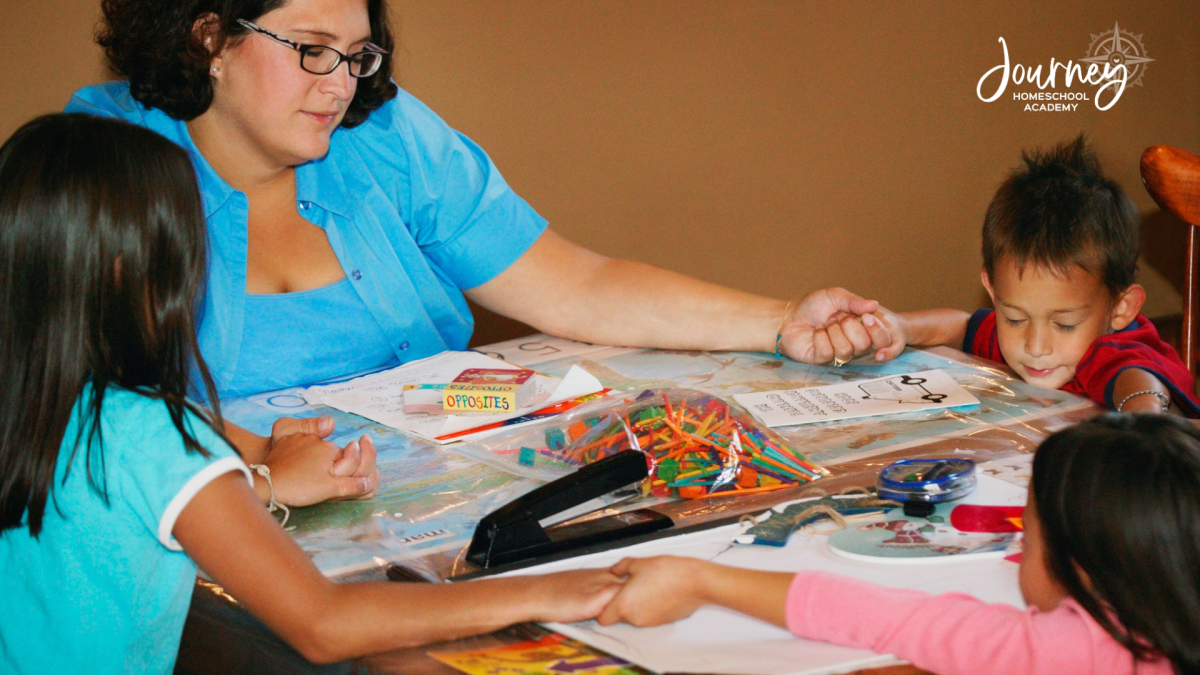You love your kids and you want them to grow in knowledge and in faith.
Yet when it comes to science, many Christian homeschool families unintentionally fall into the same traps: dry textbooks, rushed experiments, or lessons that feel disconnected from the truths of Scripture.
If you’ve ever felt that science time is more “check the box” than “spark curiosity,” you’re not alone.
Below, we’ll uncover the five most common Christian homeschool science mistakes—and share practical fixes, plus how Journey Homeschool Academy’s faith-based courses can help you sidestep every one.
Are You Making These Common Christian Homeschool Science Mistakes?

Mistake #1: Treating Science Like a Checklist
What It Looks Like
- Racing through lessons just to “finish the chapter”
- Skipping lab activities because “we don’t have time”
- Feeling relief when the unit test is over
Why It Backfires

When science becomes a to-do list, students memorize facts but never experience the wonder that drew you to homeschooling in the first place. They miss chances to ask “What if…?” and to learn by doing.
How to Fix It
- Block Time for Exploration. Dedicate at least one afternoon a week solely for hands-on activities—no lesson-plan page limits.
- Celebrate “Failed” Experiments. Share how real scientists learn from surprises.
- Use Open-Ended Prompts. Instead of “Follow steps A–D,” ask “How could you modify this experiment to test X?”
JHA Tip: In Experience Biology Elementary, dozens of hands-on activities are built into the course schedule—no extra prep or planning needed. Lifetime access lets your family go deeper on any activity that piques interest.
Mistake #2: Overlooking Biblical Integration

What It Looks Like
- Using secular science texts without referencing Scripture
- Studying biology or chemistry in isolation from faith discussions
- Wrapping up a lesson without any spiritual takeaway
Why It Backfires
Science without a biblical lens feels dry and can leave students wondering how their faith and learning fit together. They might excel at equations but miss the opportunity to worship God through creation.
How to Fix It
- Pair Scripture with Concepts. Before dissecting a flower, read Psalm 139:14 together and marvel at God’s intricate design.
- Discuss Worldview Questions. After a physics lab on motion, ask: “How does understanding Newton’s laws point us back to God’s order in creation?”
- Journal Spiritual Insights. Encourage students to keep a “Science & Scripture Journal” where they note both facts learned and faith applications.
JHA Solution: Every lesson in Discover Physics and our other high-school courses pauses to integrate Scripture—so students consistently see science as worship.
Mistake #3: Skipping the Science Corner
What It Looks Like
- Rummaging through kitchen drawers for supplies five minutes before the lesson
- Feeling discouraged when you can’t find beakers or pipettes
- Science experiments postponed due to “no equipment”
Why It Backfires
Without a dedicated, well-stocked space, science feels like an extra chore. Kids lose momentum and enthusiasm when they spend more time hunting for glue sticks than observing chemical reactions.
How to Fix It
- Designate a Shelf or Table. Label it your “Exploration Station.”
- Stock Basics Once. Keep items like vinegar, baking soda, food coloring, notebook, and safety goggles on hand.
- Restock Monthly. Check supplies at the start of each month so you’re never caught unprepared.
JHA Tip: All JHA courses include clear supply lists. For example, Earth Science Explored lists only household items plus optional kits—so your station stays simple and stress-free.
Mistake #4: Relying Solely on Textbooks

What It Looks Like
- Assigning chapters and end-of-chapter questions as the sole learning meth
- Students zoning out during reading or struggling with dense text
- No multimedia or interactive elements to reinforce concepts
Why It Backfires
Text-only learning appeals to few and leaves many students disengaged. Complex ideas benefit from visual explanations, animations, and live demonstrations.
How to Fix It
- Blend Media Types. Pair reading with videos, infographics, or interactive simulations.
- Use Living-Book Narratives. Select science books written in story form to draw students into the subject.
- Leverage Short “Memory” Videos. Five-minute recaps help cement key facts.
JHA Solution: Journey Homeschool Academy’s courses are video-based by design. In Experience Astronomy Level B our instructor uses animations, real-world footage, and discussion prompts to make stargazing both memorable and meaningful.
Mistake #5: Neglecting Scientific Habits of Mind
What It Looks Like
- Teaching facts without modeling how to think like a scientist
- Skipping hypothesis formulation or data analysis in labs
- Emphasizing “right answers” over the process of discovery
Why It Backfires
Students may score well on quizzes yet lack the critical-thinking skills needed for higher education or real-world problem solving. They memorize instead of inquire.
How to Fix It
- Practice Hypothesis-Driven Labs. Start each experiment with “I predict…” and compare results.
- Encourage Observation Journals. Have students sketch or write detailed notes on what they see.
- Discuss Experimental Design. Ask questions like “What variable could you change next time?”
JHA Tip: Each JHA course—like Experience Chemistry—includes guided journal prompts, graded quizzes, and reflective questions to build scientific habits of mind.
Practical Strategies to Elevate Your Science Teaching

- “Wonder Wednesdays.” Block out midweek for curiosity-driven experiments—no grades attached.
- Family Science Night. Invite siblings and parents to share experiments or findings.
- Devotional Connection. Pair every lab with a short devotional that ties the concept to God’s character.
- Sample Before You Commit. Check out the Preview Courses page from JHA to see how faith and science can mesh seamlessly.
How JHA Supports Your Homeschool Science Journey
| Feature | Benefit |
| Video Mentors | Expert instructors who model faith integration in every lesson |
| Hands-On Labs | Step-by-step experiments using everyday materials—no specialty equipment required |
| Flexible Access | Lifetime course access—revisit tough topics or pause for breaks without losing progress |
| Parent Resources | Answer keys, discussion guides, and optional live Q&A webinars that take the pressure off you as the teacher |
Whether you’re tackling elementary biology or high-school physics, JHA’s faith-based homeschool science courses turn common pitfalls into powerful learning opportunities.
Ready to Transform Your Science Time?

Don’t let these common mistakes derail your child’s scientific curiosity or spiritual growth. Explore all our faith-based homeschool science courses now:
🔗 Browse All Science Courses
Equip your family with tools that blend rigorous academics and a living faith—science becomes more than a subject; it becomes a journey of discovery and worship.
